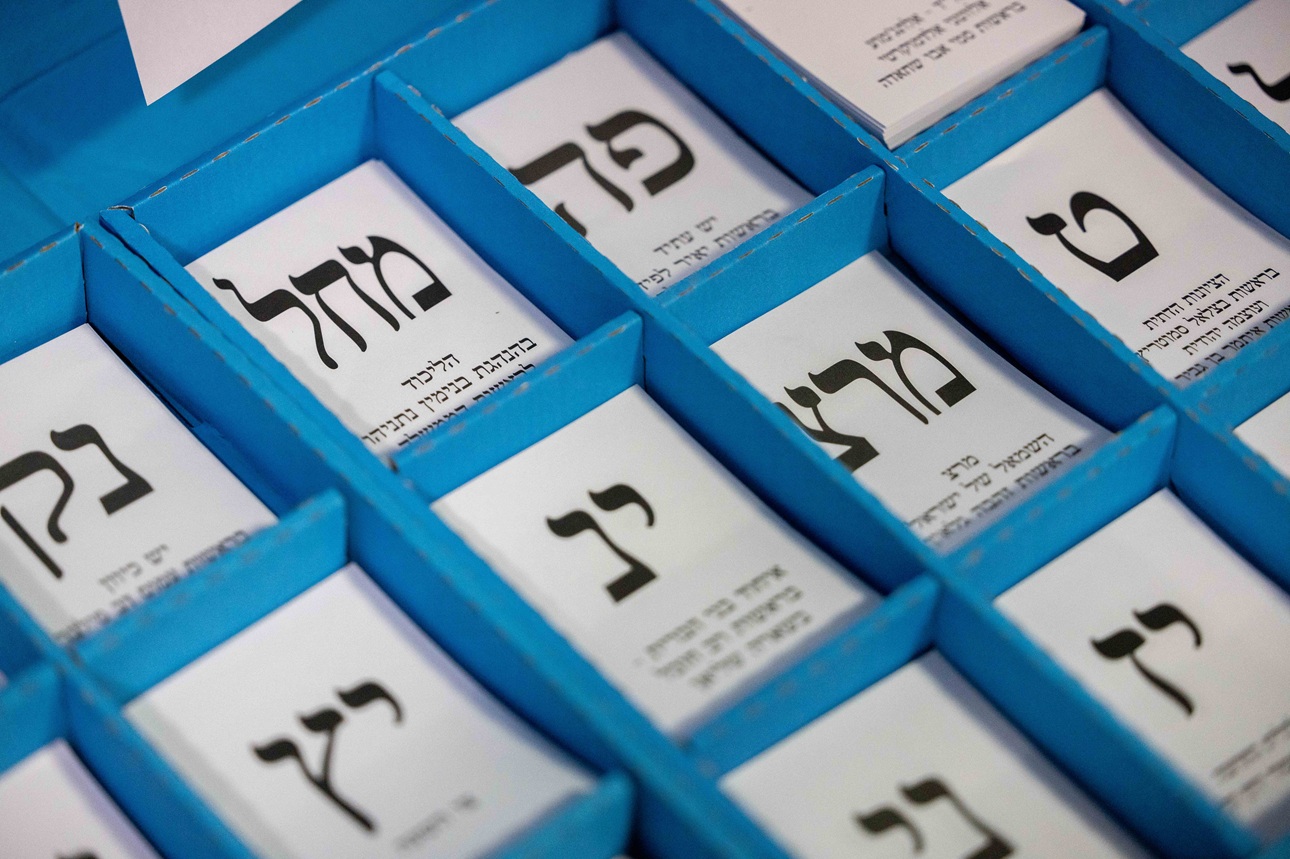The Case for Common Sense Knesset Electoral Reform
In a semi-open ballot system, voters would see electoral lists and be able to select "preferred candidates" when they vote. This commons sense reform would strengthen democracy, allowing for a fuller expression of voter preferences and an increased connection between voters and their elected officials.

Photo by Yonatan Sindel/Flash90
Knesset elections—the only national elections for Israeli government—are done through a close-list system, that is, a system in which voters select the party, but do not select the candidates for Members of Knesset (MKs) on that list. The names of the candidates do not even appear on the ballots. This week, a bill has been making its way through Knesset committees that seeks to amend this system. It would maintain Israel's proportional, closed-list system, while introducing a personal component in the form of a semi-open ballot. Under this revised model, electoral lists that choose to do so may opt to "open" their ballots. These ballots, as presented at polling stations, would include the names and ranking of candidates as submitted to the Central Elections Committee. If the voters for these lists want to, they would be able to indicate up to five “preferred candidates,” thereby expressing support for specific individuals. But voters would not be required to indicate preferences and could simply insert the ballot into the envelope without any markings.
During the vote count, preference votes cast for individual candidates would be tallied. Any candidate who receives a number of preference votes exceeding half the electoral threshold (approximately 18,000 votes in the most recent election) would be entitled to move up to second place on the list—if multiple candidates exceed half the electoral threshold, they would be placed on the list in descending order from second place based on the vote share, (the top of the list is protected and would remain unchanged). In this way, voters would have a moderate capacity to influence the ordering of candidates on the party list. Since, in a proportional representation system, each party receives the number of seats in Knesset proportionate to their share of the popular vote, this would give voters a voice in not only which party is represented in Knesset, but also which MKs hold those seats.
Such a model has genuine potential to improve the quality of candidates and elected representatives, as well as to enhance public trust in the electoral process and political institutions. Indeed, adopting a semi-open ballot has the potential to strengthen and improve Israeli democracy in the following ways:
Fuller Expression of Voter Preferences
A semi-open ballot allows voters to express their political preferences more fully and precisely than under the current system in Israel. By allowing voters to express a preference for specific candidates, they can signal support for the ideologies those individuals represent. This mechanism more fully embodies the democratic principle of participation and establishes a new, important channel of communication between the electorate and political parties.
Strengthening Public Accountability
The semi-open ballot would create a clear political incentive for elected officials to serve the public interest. This is because voters would have the power, through their vote, to reward or penalize candidates individually. Importantly, candidates would have an incentive to appeal to the broader electorate—potentially hundreds of thousands of voters.
Greater Transparency
The semi-open ballot increases transparency with regard to the composition of the party list, as voters will be presented with the names of the candidates on the ballot itself in the polling station.
This is a proposal that enjoys broad support among the Israeli public. According to a 2021 survey, 54% of Jewish respondents support the proposal and only 26% oppose it. Among Arab respondents, 69% support it, with only 24.5% in opposition. It is also a widely used model. As stated in the explanatory notes to the legislation, the overwhelming majority of developed democracies allow voters to influence party lists on election day by marking candidates. Specifically, 19 out of the 23 OECD member states that employ systems similar to Israel's (proportional representations with party-lists) allow for such personal input. An additional three countries lack a personal component but do include multi-member electoral districts. Accordingly, Israel remains the only developed democracy with a solely national, closed-list proportional representation system that includes neither a personal nor a district-based element.
That said, no electoral system is perfect—each involves potential risks and trade-offs. The semi-open ballot increases the need for individual candidates to gain early public exposure and name recognition in order to receive preference votes. While it does encourage deeper ongoing engagement with voters, it also could result in an incumbency advantage over newcomers, and it may incentivize candidates to seek out more media attention. Additional unintended consequences have been raised by critics, such as a harm to women's representation or increased corruption. Empirical findings from other countries refute these claims.
To ensure such a system would be implemented as effectively and ethically as possible, there is merit in conducting a professional and comprehensive discussion regarding various aspects of the proposal. These include: the number of candidates voters may mark; the preference vote threshold; whether parties should be required to adopt the semi-open format; issues related to campaign finance; and more. These discussions should take place in the Knesset’s committees, with the participation of party representatives, relevant professionals (especially from the Central Elections Committee), academic experts, and civil society representatives.
Overall, a carefully considered transition to a semi-open ballot system is a reasonable step towards increasing the connection between voters and their elected officials. We are not reinventing the wheel—most other democracies with a similar system to Israel afford voters the ability to influence candidate lists, and we already know such a proposal has broad support by the Israeli public. It would increase transparency and trust in the system and give voters a stronger voice in the halls of parliament.
Dr. Assaf Shapira is the Head of the Israel Democracy institute's Political Reform Program
